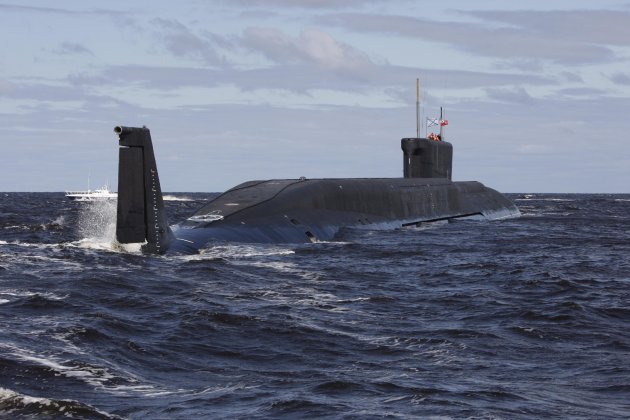Having followed the activity of Russia and the former Soviet Union for a very long time, and concluding that the Bear is far from dead, I think many of you will find this to be of interest because in reality, one day sooner than later, there may be a time when the U.S., China, and Russia all converge on the same issue from different angles.
And that may not be a very good thing.
 The Russian navy on Thursday hoisted its flag on a new nuclear powered submarine intended to form a key part of the country's future nuclear deterrent. It is part of an ambitious weapons modernization effort that comes as the military is preparing for a naval exercise off Syria's shores.
The Russian navy on Thursday hoisted its flag on a new nuclear powered submarine intended to form a key part of the country's future nuclear deterrent. It is part of an ambitious weapons modernization effort that comes as the military is preparing for a naval exercise off Syria's shores.
Defense Minister Sergei Shoigu said the war games in the Mediterranean will be the biggest such exercise since Soviet times and involve ships from all four Russian fleets. The maneuvers have been seen as a demonstration of Russian naval power and a show of support for an old ally, whom Moscow has shielded from international sanctions.
Shoigu made the statement after commissioning the new Yury Dolgoruky nuclear submarine, which carries 16 Bulava intercontinental ballistic missiles. It is the first of a new series of Borei-class submarines that will replace older Soviet-built ships. Another submarine of the same type is currently undergoing sea trials and two others are now under construction.
President Vladimir Putin congratulated the Yuri Dolgoruky's crew during a conference call Thursday, hailing the ship as a "powerful weapon that will guarantee our security."
"Submarines of that class will become an important element of sea-based strategic forces, a guarantor of global balance and security of Russia and its allies," Putin said.
Commissioning of the new submarines is part of an ambitious arms modernization program that envisages spending over 20 trillion rubles ($657 billion) on new weapons through 2020.
Putin said Thursday that 4 trillion rubles ($132 billion) of that money will be spent on commissioning the new submarines and other navy ships. "Modernization of the navy is one of the most important priorities in our work to strengthen the armed forces," he said.
Putin said the navy will commission the total of eight Borei-class ICBM nuclear submarines and eight nuclear submarines of a different Yasen class intended to hunt for enemy ships.
The construction of the Yuri Dolgoruky, named after a medieval Russian prince who founded Moscow, began in 1995 but was slowed down by a post-Soviet economic meltdown and it wasn't until 2009 when it finally entered sea trials. The submarine's commissioning was delayed further by problems with the new Bulava intercontinental ballistic missile intended to arm it.
The Bulava experienced a string of failures during tests that dragged on for years, raising doubts about the future of the most expensive military project in Russia's post-Soviet history. Recent tests, however, have been successful, allowing the navy to finally commission the submarine.
Shoigu, who attended the commissioning of the new submarine at a shipyard in Severodvinsk, said that the Bulava is fully combat ready.
Facing questions about Bulava, Putin's chief of staff Sergei Ivanov also insisted that "the navy has no reason to doubt its reliability."
A hawkish Russian Cabinet member marked the ceremony with a tongue-in-cheek comment mimicking the Cold War-era diatribes of Soviet leaders. "You bourgeoisie tremble! You are screwed!" Dmitry Rogozin, deputy prime minister in charge of military industries, wrote on Twitter.
Rogozin, a nationalist politician in the past, has been known for his bellicose and sometimes crude statements.
All this said, it would be foolish to think the Cold War is over. It is not.
No comments:
Post a Comment